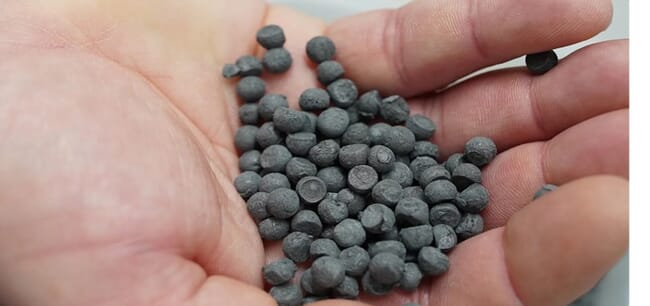
Researchers discovered the alginate-based beads offer a remarkable improvement in heat storage capacity © Swansea University
The researchers from the SPECIFIC Innovation and Knowledge Centre and COATED M2A programme at Swansea University collaborated with the University of Bath to make a ground-breaking advancement in thermal storage research, developing a new efficient material that is easily scaleable and can be sized and shaped to fit multiple applications.
Published in the Journal of Materials Science, the material has been made using alginate, an inexpensive, abundant and non-toxic seaweed derivative.
The process starts with the dissolving of sodium alginate in water. Following this, expanded graphite is added, and a method of gelation is chosen:
- The first method is achieved by transferring the solution into a mould for freezing. After being kept at -20°C for over two hours, beads are formed and transferred to a saturated calcium chloride solution.
- The second uses a drop-cast technique, with the mixture being dropped into thermochemical calcium salt, causing gelation on contact.
- Once sufficient salt diffusion has occurred, the synthesised beads are filtered and dried at 120°C.
Compared to SPECIFIC's previous carrier material, vermiculite, the alginate-based beads from both methods offer a remarkable improvement in heat storage capacity.
The new spherical beads boast increased salt capacity, achieving up to four times greater energy density than the vermiculite carrier. This is facilitated by their efficient packing in a fixed bed that maintains good airflow. As a result, the new material can achieve the same heat energy storage capacity in just a quarter of the volume.
Jack Reynolds, who led the research as part of his doctorate at Swansea University, explained in a press release: "The ability to recover and store otherwise-wasted heat from various sources, including industrial operations and the summer sun, presents an exciting opportunity in the quest for sustainable and affordable energy resources. Our new heat storage material marks a significant step forward in realising this potential."
Dr Jonathon Elvins, senior technology transfer fellow and co-author, added: "SPECIFIC remains committed to driving innovation in thermal storage technology and actively collaborating with industry partners and researchers worldwide to accelerate the transition towards a greener and more sustainable future.”


